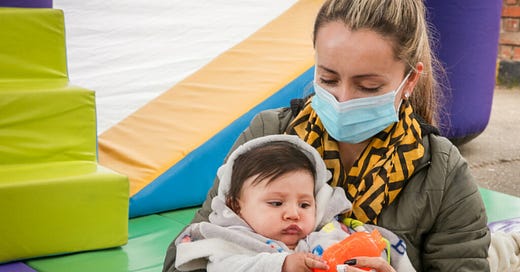While women do much of the ‘care work’ that keeps our society functioning, rarely has that work been acknowledged and supported in a practical and planned way. In one Latin American city, however, a profound cultural transformation about care work in homes and society has put women at the center of Bogotá's urban transformation and future planning.
OPSI photo
During the pandemic, Bogotá designed and piloted the first city-level care system in Latin America. Care Blocks localize personal development, self-care, income generation, and engagement and political participation services provided by the city, the national government, some private sector groups and even some few communal and household-driven ones.
In Bogotá, 30% of the city's female population are full-time unpaid caregivers. Ninety per cent of them have low incomes; 33% lack time for self-care; and 70% have only a primary school education. These statistics worsened during the pandemic. (In 2010, Colombia became the first country to require that women’s contributions to the care economy be documented.)
But the Care Blocks program has transformed life for half a million women by sharing the responsibility of care-taking more equitably, so they can pursue personal development activities. For example, a caregiver can enrol in a program to complete high school while her grandchild takes part in playful activities. This approach has created “the smallest labour gap between men and women of all its history.” The Care Block also offers services for men to learn home tasks such as ironing, baby care, and household financial organization.
In the Blocks, within walking distance, women can study, train, access employment and entrepreneurship opportunities, receive health advice, access psychosocial and legal care, relax and have greater autonomy and freedom - even as those they care for, the vast majority of them children, people with disabilities and the elderly, can enjoy activities to develop skills and promote their autonomy.
City services used to be mostly siloed, widespread across the city and/or centralized in few areas, so few caregivers accessed them. The Care Blocks
place caregivers at the center of the policy and service delivery design,
re-organize the city to meet peoples' needs, instead of the other way around, and
address the inequality of the care burden from a cultural and societal perspective, thus ensuring long-term sustainable change.
In rural and peripheral areas, far from a Care Block, Care Buses guarantee mobility and access to services. For the 14% of full-time female caregivers who cannot access the Care Block premises or services, a Care Home Delivery program delivers services to both caregivers and those who require special care in their own households.
Bogotá’s Mayor Claudia López Hernández—the first woman to be elected mayor—aims to transform Bogotá into a "caring City." Before the end of her administration in 2023, the city plans to reach at least one million women with 20 CARE Blocks, CARE buses, and CARE Home Delivery.
In 2020, the legislative body of Bogotá approved the CARE System unanimously across political parties, budgeting it as part of the City Development Plan 2020-2024. Philanthropic resources and support strengthen the durability of the CARE System.
Long term, the program will reach more than 60% of the city’s population as Bogotá's Urban Master Plan includes the Care Blocks as the core of its planning. The 2021 plan includes and budgets for 45 CARE Blocks by 2035. The CARE System aims to achieve the Sustainable Development Goals to attain “gender equality and empower all women and girls” and to “recognize and value unpaid care and domestic work through the provision of public services, infrastructure and social protection policies, and the promotion of shared responsibility within the household and the family as nationally appropriate.”
Ultimately, the goal is to embed the CARE System so deeply in the city’s vision and governing systems that it becomes a permanent and essential part of Bogotá’s services regardless of the priorities of the future city leaders.
It has, unsurprisingly, not been all smooth sailing. The city was sued in 2021 by a man who objected to the care blocks’ focus on women. La Rolita, an all-electric fleet of city buses which women are being trained and hired to drive and maintain, also inspired a lawsuit.
But Diana Rodríguez Franco, Bogotá’s secretary for women’s affairs, is heartened that some men are now coming to the care blocks with their female partners to finish high school or learn to use computers. Of the 849 people who earned high school diplomas at care blocks in 2022 and 2023, only 21 were men, but boys and men account for more than a quarter of the 406,000 people who have benefited from direct services, including day care.
For a big city like Bogotá, the most innovative aspects of the Care Blocks are on "how" services are provided and the interoperability among them. Representatives of the city's advisory councils (including those of women, children, LGBTI, and city councils on disability, indigenous women and Afro-Colombian women), as well as organizations of female caregivers, sit on the Intersectoral Commission, helping ensure that caregivers have voice and vote in the decision-making.
The Bogotá Care System has been replicated in San Pedro Garza García, México, and the city has gotten requests for technical advice from cities such as Medellín, Cartagena and Cali, the Colombian National Government, Perú, Argentina, Chile, Dominican Republic, and México, and internal city networks.
In January 2022, Bogotá won the Carter Center Transforming Lives Campaign; The Open Society Foundation provided funding to pilot the first 2 Care Buses of the Care System and a Cultural Change Strategy 2020 - 2022. In 2021, it was awarded the Bloomberg Global Mayors Challenge award.
The Care Blocks were inspired by Uruguay's National Care System. It also reflects an extensive body of work on womens unpaid care work done by the Huairou Commission since 1995, and work on GDP by people such as Marilyn Waring which has inspired many countries to track unpaid work, by women and men, through their census.




